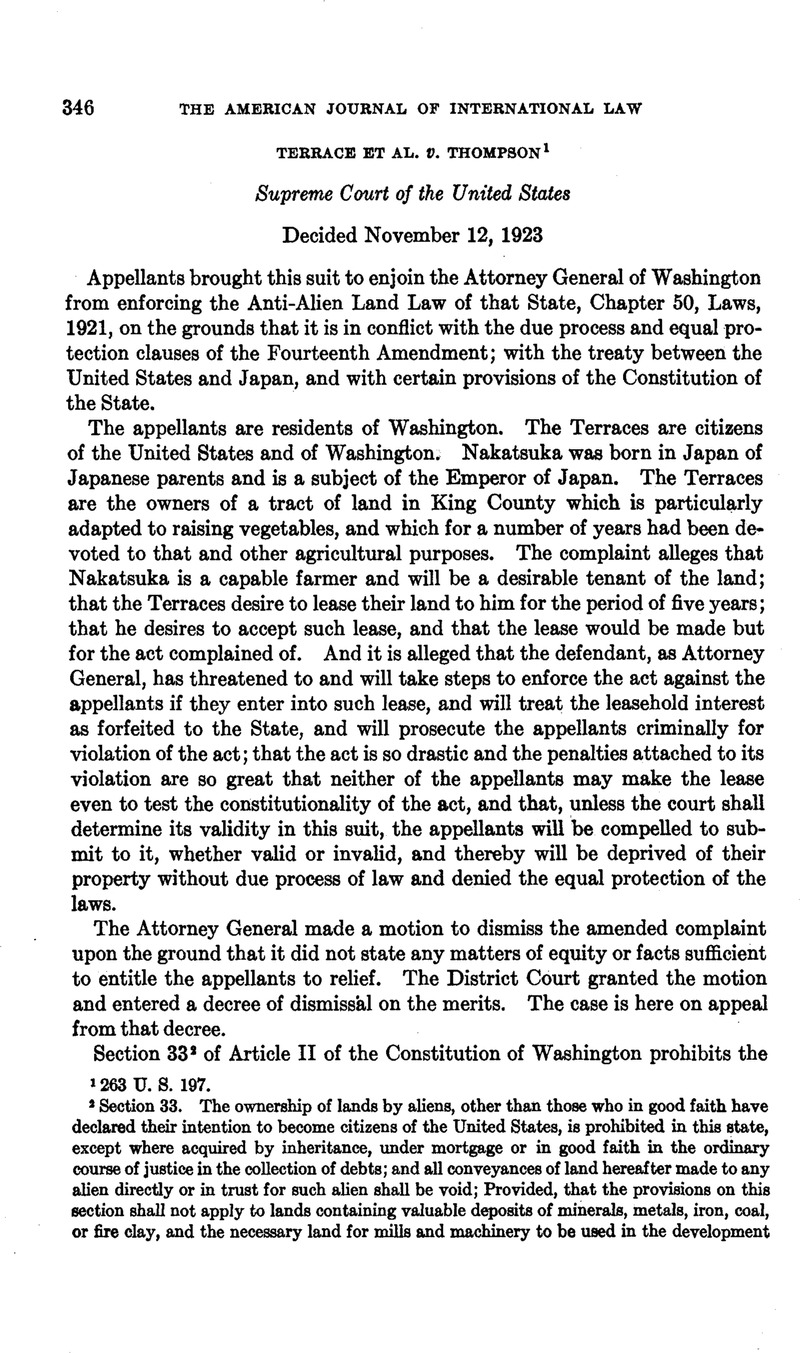No CrossRef data available.

263 U.S.197.
2 Section 33. The ownership of lands by aliens, other than those who in good faith have declared their intention to become citizens of the United States, is prohibited in this state,except where acquired by inheritance, under mortgage or in good faith in the ordinary course of justice in the collection of debts; and all conveyances of land hereafter made to any alien directly or in trust for such alien shall be void; Provided, that the provisions on this section shall not apply to lands containing valuable deposits of minerals, metals, iron, coal,or fire clay, and the necessary land for mills and machinery to be used in the development thereof and the manufacture of the products therefrom. Every corporation, the majority of the capital stock of which is owned by aliens, shall be considered an alien for the purposeof this prohibition.
3 Section 1. In this act, unless the context otherwise requires,
(a) “ Alien” does not include an alien who has in good faith declared his intention to become a citizen of the United States, but does include all other aliens and all corporations and other organized groups of persons a majority of whosecapital stock is owned or controlled by aliens or a majority of whose members are aliens;
(b) “ Land” does not include landscontaining valuable deposits of minerals, metals,iron, coal or fire clay or the necessary land for ills and machinery to be used in the developmentthereof and the manufacture of the products therefrom, but does include every other kind of land and every interest therein and right to the control, possession, use, enjoyment, rents, issues or profits thereof. . . .
(d) To “ own” means to have the legal or equitable title to or the right to any benefit of;
(e) “ Title” includes every kind of legal or equitable title;
. . . .
Section 2. An alien shall not own land or take or hold title thereto. No person shall take or hold land or title to land for an alien. Land now held by or for aliens in violation of the constitution of the state is forfeited to and declared to be the property of the state. Land hereafter conveyed to or for the use of aliens in violation of the constitution or of this act shall thereby be forfeited to and become the property of the state.
4 In Fairfax's Devisee v. Hunter's Lessee, 7 Cranch 603, 609, 619, 620, it was said, per Story, J.: “ It is clear by the common law, that analien can take lands by purchase, though not by descent; or in other words he cannot take by the act of law, but he may by the act of the party. . . . In the language of the ancient law, the alien has the capacity to take, but not to hold lands, and they may be seized into the hands of the sovereign.” See also 1 Cooley's Blackstone (4th ed.) 315, *372; 2 Kent's Commentaries (14th ed.) 80, *54.
5 Act of March 3,1863, c. 75,12 Stat. 731; Act of April 22,1898, c. 187,30 Stat. 361; Act of January 21,1903, c. 196, 32 Stat. 775; Act of June 3,1916, c. 134,§§ 57, 111, 39 Stat. 197; Act of May 18,1917, c. 15,§ 2; Act of July 9, 1918, c. 143; Act of August 31,1918, c. 166,40 Stat. 76, 884, 955.
6 Act of June 29,1906, c. 3592, 34 Stat. 596, as amended; Act of June 25,1910, c. 401, 36 Stat. 829.
7 Act of July 14, 1870, c. 254, §7, 16 Stat. 256, as amended; Act of February 18,1875, c. 80, 18 Stat. 318; Ozawa t>. United States. 260 U. S. 178; United States v. Thind, 261 U. S, 204.
8 37 Stat. 1504-1509.